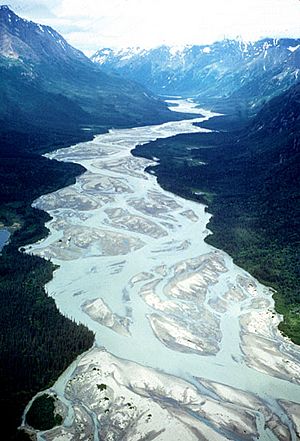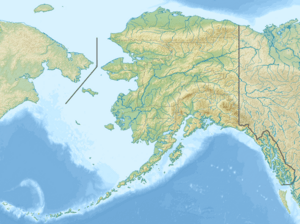Tlikakila River facts for kids
Quick facts for kids Tlikakila River |
|
|---|---|

Flowing through mountains
|
|
|
Location of the mouth of the Tlikakila River in Alaska
|
|
| Country | United States |
| State | Alaska |
| Borough | Kenai Peninsula, Lake and Peninsula |
| Physical characteristics | |
| Main source | Summit Lake Lake Clark National Park, Aleutian Range, Kenai Peninsula Borough 888 ft (271 m) 60°47′06″N 152°47′46″W / 60.78500°N 152.79611°W |
| River mouth | Little Clark Lake 45 miles (72 km) northeast of Nondalton, Lake and Peninsula Borough 253 ft (77 m) 60°23′31″N 153°48′37″W / 60.39194°N 153.81028°W |
| Length | 51 mi (82 km) |
| Basin features | |
| Basin size | 622 sq mi (1,610 km2) |
| Type: | Wild |
| Designated: | December 2, 1980 |
The Tlikakila River is a beautiful river in Alaska, a state in the United States. It's about 51 miles (82 km) long. The local Dena'ina Athabascan people call it Łiq'a Qilanhtnu, which means "salmon-are-there river." This special river flows entirely inside Lake Clark National Park. It starts at Summit Lake in the Chigmit Mountains and flows southwest until it reaches Lake Clark.
The Tlikakila is one of three "wild rivers" found in Lake Clark National Park. A "wild river" is a special kind of river that is protected. It means the river and its surroundings are kept natural and undeveloped. The other two wild rivers in the park are the Mulchatna and the Chilikadrotna. All three were added to the National Wild and Scenic Rivers System in 1980. This system helps protect America's most amazing rivers.
Boating Adventures
The Tlikakila River is a great place for boating, especially for people who like adventure! You can float down the river in a raft or a kayak. The river has different levels of difficulty, from Class I (easy) to Class III (more difficult). These levels are part of the International Scale of River Difficulty.
The Alaska River Guide book says the Tlikakila River is good for "intermediate boaters." This means you should have some experience with boating and be good at wilderness skills.
To start your trip, you might need to carry your boat for about 2-mile (3 km). This is called a portage. It means you carry your boat over land to get to a different part of the river.
There are some challenges on the river. You might find Class III rapids, which are fast and bumpy sections of water. Sometimes, you might need to do another portage to get around these rapids. Also, you should be aware of bears in the area. And in the lower parts of the river, there can be quicksand, so be careful where you step!
 | Bayard Rustin |
 | Jeannette Carter |
 | Jeremiah A. Brown |


